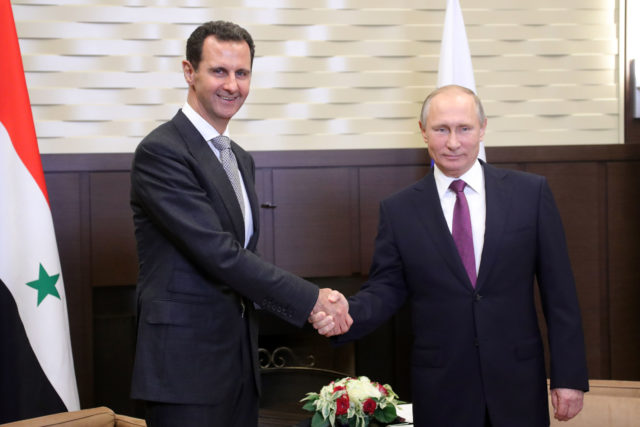President Obama’s fecklessness in Syria and the Iran deal forced Jerusalem to choose survival over its principles.
As Vladimir Putin’s barbaric assault on Ukraine unfolds, the public conversation about Israel’s response has grown predictable. On one side are the defenders of realpolitik, including many Israelis, who see the need for coordination with Russia in Israel’s fight against terrorism on its northern border. On the other side are a small group of moralists, myself included, who regard Mr. Putin’s actions as the ultimate threat to freedom and who urge Israel to join the rest of the civilized world in standing unequivocally against him.Israel’s leaders have hewn a cautious path between the two. Prime Minister Naftali Bennett met with Mr. Putin in the Kremlin over the weekend and spoke to Ukrainian President Volodymr Zelensky by phone. One week into the war the Israeli government declined to join 81 other countries in co-sponsoring a United Nations Security Council resolution against the Russian invasion. The Israeli government has repeatedly declined requests for military aid from Mr. Zelensky. But Israel has sent significant humanitarian aid and condemned the Russian invasion in the U.N. General Assembly.
Every country that values democracy and human rights ought to stand in solidarity against Mr. Putin’s actions. Yet when former U.S. Defense Secretary William Cohen tells a reporter he is “deeply disappointed” with Israel and demands that we choose between Russia and the U.S., it is clear an important point has been forgotten: It was America’s lack of moral clarity that forced Israel to become so dependent on Mr. Putin.
How did this happen? The first major development was President Barack Obama’s disastrous response to Syrian dictator Bashar al-Assad’s use of chemical weapons against his own people. In 2012 Mr. Obama declared chemical weapons to be a “red line” in the Syrian conflict, the factor that would lead him to use military force against Mr. Assad. In 2013 reports surfaced of a devastating chemical weapons attack in the rebel-controlled suburbs of Damascus. Hundreds of civilians were killed. Yet the Obama administration delayed action and the momentum for a military intervention faded, leading to a massive humanitarian crisis.
Mr. Putin saw the U.S. retreat in Syria as a sign of weakness and exploited the opportunity to advance his project of renewing Russia’s great-power status. In 2014 he invaded Crimea. In 2015 he established a military base in Khmeimim, Syria, and began air strikes to support Mr. Assad’s forces there. Both maneuvers provided him with an opportunity to test his military strength. His presence in Syria further ensured that the keys to Syrian airspace would remain in his hands.
The next development in the U.S. abdication of moral leadership was the 2015 nuclear deal with Iran. The agreement neglected to demand that Iran respect human rights and end its support for global terrorism in exchange for billions of dollars in cash. A significant portion of these funds went to Hezbollah, which in turn managed to transform itself from a partisan group into an army, building bases in Syria and continuing its operations there and in Lebanon.
Israel had no choice but to reach a strategic agreement with Russia to fight against Iran and its proxies. In protecting itself from terrorist aggression, Israel must consider Russia’s presence in Syria and secure Mr. Putin’s agreement for airstrikes against targets there. This arrangement, which began under Prime Minister Benjamin Netanyahu, renders Israel dependent on Russia’s goodwill even now, during Mr. Putin’s worst aggressions to date.
Making matters worse, an imminent nuclear deal with Iran will give yet more money to the regime without any linkage to its behavior. As a result, Israel will become even more dependent on Russia.
Israel would not have been forced to choose between its principles and survival had it not been for the lack of moral clarity in Europe and the U.S. The same free world that now stands in solidarity against one dictator is on the verge of signing–with that very dictator–an agreement that would give hundreds of billions of dollars to another corrupt, oppressive regime that has vowed to destroy Israel.
It isn’t too late to change this state of affairs. One option is to table the latest Iranian nuclear agreement and instead make clear to Tehran’s theocrats that their aggressions won’t be tolerated, let alone rewarded. If a deal is inevitable, another solution is to tie financial support for Iran to the latter’s verifiable commitment to protect human rights at home and cease its terrorist incitement abroad. This simple solution, which both the Obama and Biden administrations have thus far refused to accept, would not only reflect moral clarity, it would undermine Mr. Putin’s growing power on the world stage.
Russia’s actions in Ukraine are a test for the free world, which is why my government’s reluctance to oppose them forcefully is disappointing. Yet the reality of Israel’s dependence on Russia shows again that if the U.S. wants to lead the free world in confronting tyranny, its actions in confronting tyrants must be clear and consistent.
Natan Sharansky is a former Soviet dissident, Israeli government minister and author of The Case for Democracy. He is chairman of the International Supervisory Board of Kyiv’s Babyn Yar Holocaust Memorial Center. Reprinted with permission of The Wall Street Journal.






